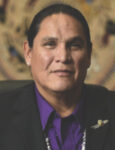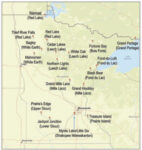
Congressional criticism of the National Indian Gaming Commission, which is responsible for federal oversight of American Indian casinos, erupted again last July when the U.S. Senate Committee on Indian Affairs discussed a pending government audit of the agency.
“One of my primary concerns continues to be the performance and legal limitations of the National Indian Gaming Commission as the chief federal regulator for Indian gaming,” NIGC critic Senator John McCain (R-Arizona) told the committee.
McCain, who has long pressed for greater federal authority over the $28 billion tribal gaming industry, joined with committee Chairman Joe Barrasso (R-Wyoming) and anti-gambling advocate Senator Dianne Feinstein (D-California) in seeking the Government Accountability Office (GAO) audit.
A preliminary GAO report says NIGC enforcement “decreased significantly” since 2009 due to an emphasis on technical assistance and training rather than disciplinary action to achieve compliance with the Indian Gaming Regulatory Act (IGRA). The final audit is due this spring.
Acting NIGC Chairman Jonodev Chaudhuri, a Muskogee Creek awaiting Senate confirmation, assured the committee the so-called ACE (assistance, compliance and enforcement) initiative has not resulted in lax enforcement of gambling laws.
“Nothing about our enforcement and oversight responsibilities has in any way diminished by the recognition of the benefits of working with tribal regulators on the front end,” Chaudhuri said.
Some senators remain skeptical.
“Effectiveness of the ACE initiative is the key point of this whole thing, so we look forward to that additional GAO follow-up report,” Barrasso said.
Balancing the need for federal oversight of Indian casinos with the U.S. Supreme Court 1987 ruling giving tribes sovereignty over gambling on Indian lands has been a source of debate since IGRA was enacted the following year.
Positive Feedback
Tribal governments and regulators have embraced NIGC’s tribal-friendly policies under President Obama, contending they adhere to IGRA mandates that 247 gambling tribes have primacy for the regulation of the nation’s approximately 450 casinos in 28 states.
Many tribes spend $8 million or more a year on security and surveillance and a small army of accountants, technicians and specialists, often to regulate a single casino. The National Indian Gaming Association says tribes annually spend $319 million to regulate gambling.
The industry has been virtually free of scandal. But there have been a handful of tribal disputes resulting in at times volatile takeovers of Indian casinos.
There was much tribal criticism of NIGC under Chairman Phil Hogen, an Oglala Lakota and Bush administration appointee who was accused of being heavy-handed and failing to adequately consult with tribes.
“The current NIGC policy is more in line with the legislative intent of IGRA,” Oklahoma Cherokee Jamie Hummingbird, chairman of the National Tribal Gaming Commissioners and Regulators (NTGCR), told Pechanga.net.
“The agency was not intended or designed in IGRA to be an active regulator, but to provide oversight; to be an educator, a trainer. The agency was intended to work with the tribes, not ride roughshod over the tribes.”
NIGC in 2013 held 194 workshops providing 754 hours of training and technical assistance to 2,751 participants, most of whom praised the programs, according to GAO’s preliminary report.
Most agree with Hummingbird’s assessment of NIGC policy, including 10 current and former tribal regulators and others surveyed by Tribal Government Gaming magazine for this article.
“What (the Obama NIGC) did was transfer authority to where it belongs, which is with the tribal commissions,” says former NIGC commissioner Teri Poust, a member of the Poarch Band of Creek Indians of Alabama.
“The NIGC was not intended and it does not have the statutory authority, the structure nor the resources under the law to be this be-all everything regulatory agency,” says John Tahsuda, a Kiowa-Comanche and principal of Navigators Global, a Capitol Hill consulting firm.
“Twenty years ago maybe a bigger, more expansive federal regulatory agency would have been appropriate,” he says. “The gap has, in the meantime, been filled by the tribes.”
Big Blowback
But there is increasing fear in Indian Country that the regulatory pendulum is swinging too far in the wrong direction—that easing NIGC enforcement is generating a political backlash and eroding the regulatory integrity of the tribal casino industry.
Major areas of concern raised by those consulted by Tribal Government Gaming include:
• NIGC’s failure to take action against the Bay Mills Indian community of Michigan for pursuing a casino on non-trust lands, an act of defiance that led to a potentially damaging U.S. Supreme Court ruling.
• NIGC’s lack of leadership on internet gambling as tribes launch social gaming websites and, in California, a potentially landmark real-money bingo operation that has prompted federal and state lawsuits.
• NIGC’s inability to prevent casino takeovers by factions of the Paskenta Band of Nomlaki Indians and Picayune Rancheria of Chukchansi Indians in California, at times violent confrontations that embarrassed the industry.
Lacking a proactive regulatory approach to these and other issues, critics say, could render the agency meaningless.
“If the agency doesn’t engage on key issues in Indian gaming, largely as it relates to things like the internet and enforcement of its regulations, I think NIGC runs a real risk of becoming irrelevant,” says Rosebud Sioux Joe Valandra, a consultant and former NIGC chief of staff.
“The NIGC is not fulfilling the intent of IGRA,” says a former tribal regulator who requested anonymity. “It’s not about training. It’s about oversight. It’s about enforcement.”
“Unless and until tribes sense that if they do something wrong and they don’t fix it there’s going to be an adverse consequence—whether it’s a fine, closure or whatever—the regulatory body is going to lose the posture it’s got to have,” Hogen says.
“The NIGC made a policy decision that they’re going to regulate with a light hand, or a lighter hand,” Hogen says. “The jury is still out on that. I hope that Indian Country is no worse for that.”
Chaudhuri defends the ACE initiative and denies NIGC is abdicating its enforcement role, despite GAO findings that agency notices of violations (NOVs) have nose-dived since 2009.
“I want there to be the optimal sweet spot between respect for tribal sovereignty and doing our job as regulators, to make sure that the industry is protected,” Chaudhuri says. “I think we can do both. The pendulum can’t go too far in either direction.
“You can’t just tick off NOVs and think you’re doing your job as the regulator. That is absolutely disrespectful to tribal regulators. It’s repugnant to notions of sovereignty.
“Further, it runs the risk of missing out on opportunities to leverage active communication with the more than 5,400 tribal regulators in the field.
“At the same time you can’t just wash your hands of the hard calls in Indian Country and say, ‘We’ll just completely leave it up to our partners and look the other way.’ We can’t take a completely hands-off approach to enforcement.
“There is a sweet spot between the two, and I think that’s where we’re going.”
Looming Study Spells Controversy
Some fear McCain and others will use the GAO audit to seek greater federal regulation of tribal casinos, possibly by amending IGRA.
The preliminary GAO report says NOVs fell from 45 in 2009 to three each in 2010 and 2011, one in 2012 and none in 2013. Of the 45 2009 NOVs, 38 were for late “quarterly statement or fee submission,” six for delayed audits and one for improper per-capita payments.
Regulations limiting the use of NOVs were enacted after Hogen left the agency.
“Based on the preliminary findings the GAO will certainly show that enforcements are down,” says Jana McKeag, an Oklahoma Cherokee and president of Lowry Strategies, a Washington consulting firm. “Critics will use that to seek greater federal regulations.”
NIGC was established largely to maintain the integrity of the industry through oversight functions—monitoring the work of tribal commissions, enacting regulations, auditing operations and approving management compacts and tribal ordinances.
But its ability to promulgate minimum internal control standards (MICS) for casino-style, Class III gambling was crippled by a 2006 federal court ruling involving the Colorado River Indian tribes. Class III gambling constitutes the bulk of the industry. Roughly 300,000 of the 350,000 slot machines in Indian country are Class III devices.
IGRA requires that tribes seeking to operate Class III gambling enter into tribal-state regulatory agreements, or compacts, with states in which they are located. McCain supports amending IGRA to expand NIGC jurisdiction over Class III gambling.
Hogen pressed for Class III MICS, which many believe saved the tribal industry more than $1 billion during its infancy, a period when it may have been preferable to have an assertive NIGC rather than risk a scandal that could have crippled a fledgling industry.
“When you look back, it was kind of frightening,” Hogen recalls. “There were tribal councils that served as gaming commissions and didn’t know the difference between the function of one and the other. It caused a concern.
“Tribal commissions have improved, matured. There’s been an evolution.”
Tribes ‘Lucky’ In Bay Mills Decision
NIGC was criticized for failing to act in 2010, when Bay Mills opened a casino on land not held in trust for gambling, prompting a potentially damaging U.S. Supreme Court review.
NIGC had opined it could not close Bay Mills because its jurisdiction was limited to Indian lands, a position that ignited the ire of the National Congress of American Indians and other tribal groups.
Fortunately, justices last year in a Bay Mills ruling upheld tribal sovereignty, ending a string of anti-Indian decisions.
“I was very proud of our team at the NIGC in their efforts to coordinate with the Department of Justice and the Department of the Interior to submit an amicus brief in support of sovereign immunity,” Chaudhuri said in a telephone interview during which he mostly read responses hurriedly supplied by an NIGC attorney.
Others are more critical.
“The NIGC should have dealt with Bay Mills within the administrative process and avoided the litigation,” says NTGCR attorney Sharon House, a Wisconsin Oneida.
“Bad law is often made when policymakers don’t take the bull by the horns,” Valandra says. “We got lucky in Bay Mills. No one expected that outcome.”
Internet Action Needed
Tribes have pressed NIGC to take the lead in internet gambling, beginning in 2010 with NIGC Chairwoman Tracie Stevens, a Washington Tulalip and Obama appointee who stonewalled Indian Affairs Committee attempts to discuss NIGC’s ability to regulate online wagering.
NIGC has refused to revisit a 2000 opinion on off-reservation wagers.
It has also declined to weigh in on the Ipai Nation of Santa Ysabel’s effort to launch a Class II bingo website on its San Diego County reservation. The tribe is locked in potentially landmark federal and state lawsuits over the shuttered website.
“Tribes are moving on internet wagering,” House says. “It would be much more beneficial if they could do it in conjunction with NIGC. Instead of making opinions to provide guidance, NIGC waits until it becomes a real issue. By then the matter is too far gone.”
“They have tiptoed into the internet,” says Tom Foley, former NIGC commissioner. “They are afraid to take any leadership in that area.”
Chaudhuri says the agency, “through our training and technical assistance,” provides guidance on the internet.
“In light of the various types of proposed activities being developed, it is impossible for me or anyone at the agency to weigh in on the viability of a given game or operation without a thorough review,” he says.
“Providing a general statement on the various types of games would not only be impractical, it would be largely unhelpful to people who seek clarification of a given game.”
Slow Dispute Response
Both the Paskenta and Chukchansi disputes resulted in violent confrontations. Paskenta’s Rolling Hills Casino has reopened. But the Chukchansi Gold Casino & Resort remains closed following an October court order requested by state and NIGC officials.
Chukchansi, it was learned, had not submitted an audit to NIGC for more than two years.
“Two years with no audits. That should have been a warning sign,” McKeag says.
Paskenta failed to get an NIGC shutdown of the facility “because there were allegations millions of dollars were going out the back door,” McKeag says. “There was certainly the potential for violence.”
“It isn’t bad policy if you have a tribe engaged in some turmoil—where you know there’s nothing terribly wrong—that you give them time to file financial statements,” Valandra says. “But in the case of Chukchansi there was a serious problem.”
“The agency was very active in its response to both” tribes, Chaudhuri counters. “As to Chukchansi, multiple NOVs were issued and prior to those NOVs multiple letters of concern were sent to the tribe.”
Chaudhuri and NIGC counsel did not elaborate.
Protecting Tribal Assets
Tribes hailed Stevens as a refreshing alternative to Hogen. She increased tribal consultations, launched the ACE initiative, streamlined regulations and limited NOVs for late audits and fees. She also merged audit and enforcement divisions into a single compliance unit.
Stevens also promulgated new Class II regulations and machine standards that promoted the industry and made it easier for tribes to self-regulate bingo-style gambling.
But Stevens, one of the few non-lawyer chairs of NIGC, lacked regulatory and legal experience. She was the first NIGC chair to hire an in-house counsel to assist her in answering regulatory questions.
She also was criticized for blurring the distinction between regulating and facilitating the industry. Her tribal-friendly approach earned her a standing ovation from tribal leaders attending a 2011 gaming conference, an unusual response to an industry regulator.
Chaudhuri has at least partially backed off from Stevens’ pro-industry position.
“We have a statutory mission to ensure the integrity of gaming,” he says. “I don’t think it would be accurate to say any of our actions would be geared to marketplace considerations.”
Virtually all the testimony in dozens of hours of tribal consultations conducted by Stevens was focused on means of streamlining regulations to the benefit of tribal regulators and elected officials.
There was no discussion of means by which regulations could better ensure the protection of casino resources for tribal citizens.
“The first thing anybody working with the federal government on behalf of Indian tribes needs to know, and remember, is they have a trust responsibility to the Indians,” Hogen said shortly after stepping down as NIGC chairman.
“That doesn’t mean tribal leaders or casino regulators or the folks sitting across the table, but the walk-around Indians: the young people out there going to school on scholarships; the sick needing dialysis treatment.
“That’s the priority, to make sure gaming dollars don’t walk out the back door.”
Fearing Fallout
Attorney House contends much of the controversy over the need for federal oversight could be allayed if tribal commissions did more to promote the work they do in regulating the industry.
“The regulators know how to regulate,” she says. “But their work goes unnoticed.”
Tahsuda is optimistic the GAO will come out with a final report favorable to the tribes.
But Hummingbird is not so sure.
“It could be very damaging,” he says. “Tribes have worked hard to develop regulations and build their reputation. If the report paints the NIGC as not providing adequate oversight, it may take years to get that trust back.”













